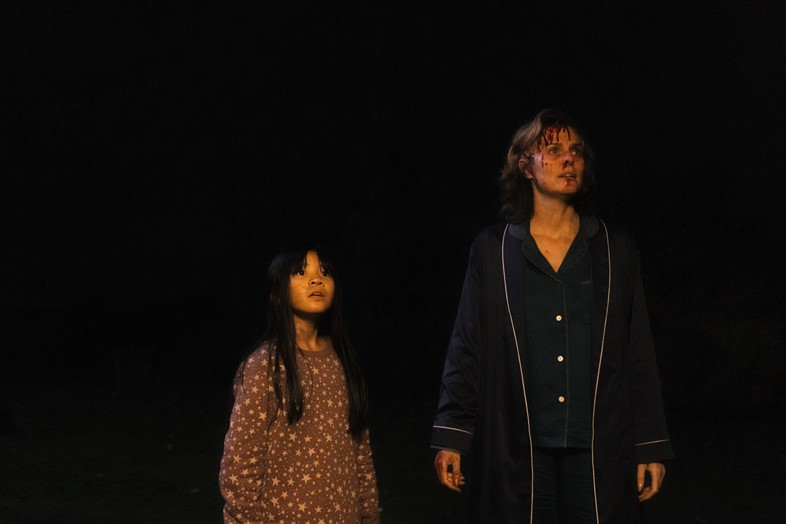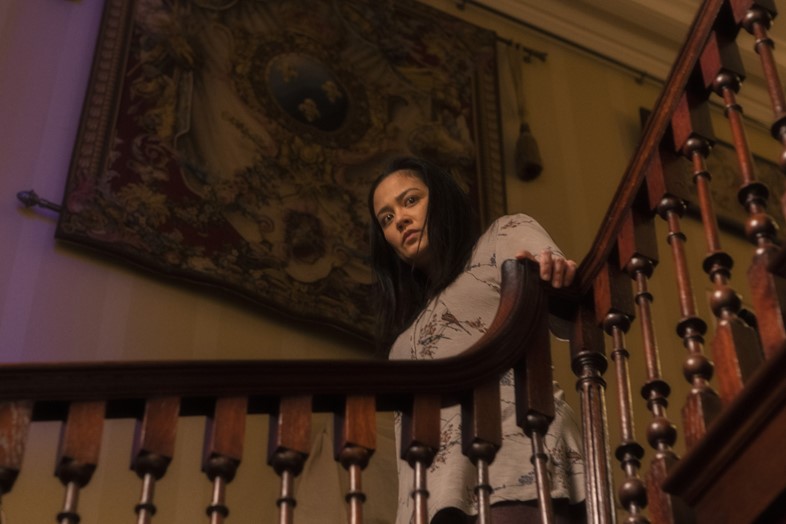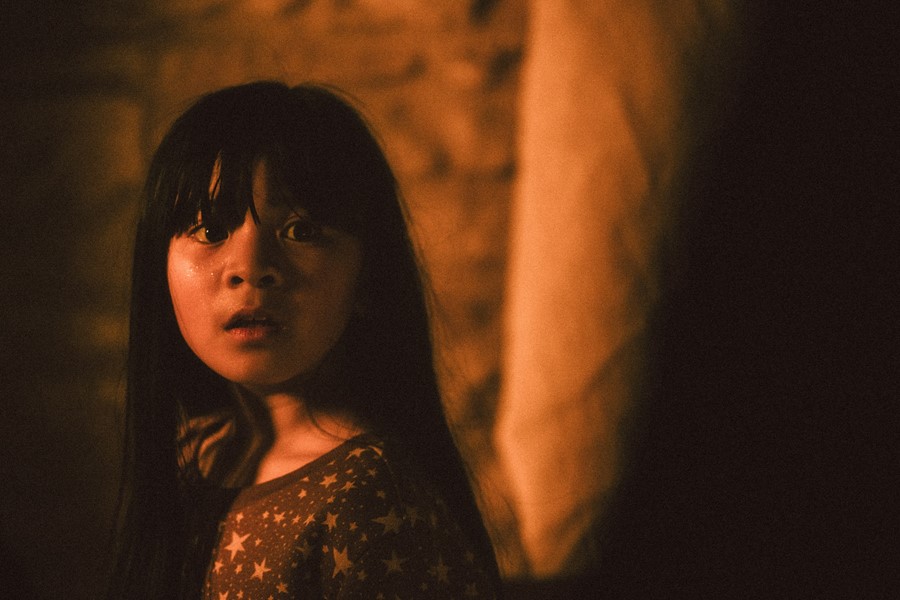We speak to Paris Zarcilla about his gothic debut feature which lays bare the true horror of Britain’s immigration system
Before its superfun, supernatural machinations kick in, Raging Grace is already a horror movie. Written and directed by Paris Zarcilla, the shape-shifting, rug-pulling, socio-political thriller follows an undocumented Filipino woman, Joy (Max Eigenmann), who hides her daughter, Grace (Jaeden Boadilla), in a suitcase. At a mansion owned by Master Garrett (David Hayman), Joy is hired to clean and occasionally pop pills into the dying aristocrat’s mouth by his niece, Katherine (Leanne Best), a white woman who’s so patronising and incurious that she’s oblivious to Grace running rampant around the house.
Deemed a “coming-of-rage” movie by Zarcilla, Raging Grace was inspired by the open aggression towards East and South-East Asians in 2020. “There was a toxic rhetoric towards immigrants,” the British-born Filipino director tells me in the Curzon Soho café in early December. “The very immigrants who were supporting a very underfunded NHS. My mother had to come out of retirement to help. Writing this film allowed me to truly express my anger and frustration.” The screenplay quotes racist abuse he and his family members have received in real life. “To hear it out loud on set, and then re-experience it in the edit – I didn’t realise it’d take such a heavy toll on me. That rage drove me to complete the film.”
Raging Grace is not only the first British-Filipino film to be produced in the UK, it’s also the only British film to win the Best Narrative Feature prize at SXSW – an award that, a year earlier, kickstarted the Oscar campaign for Everything Everywhere All At Once. And like the Daniels’ dimension-jumping comedy, Zarcilla’s debut feature defies easy classification, especially when it enters the realm of gothic horror by poetically exploring the ghosts of Britain’s racist history.
“Genre allowed me to confront the nuances of macro and microaggressions,” Zarcilla explains. “Horror allowed me to confront big topics like British colonialism and its fallout. It allowed me to challenge new and old white power in fantastical ways.” Moreover, Raging Grace is an edge-of-your-seat popcorn romp with laughs, jump-scares, and claustrophobic set-pieces that utilise shadows and extravagant architecture. “This isn’t me making light of serious themes or commodifying my trauma,” he says. “It’s moving the needle in a direction that allows us to express who we are as people onscreen, and for it to be celebrated.”
Before Raging Grace, Zarcilla directed shorts, TV shows, and music videos. He also went hugely viral (58k retweets, 170k faves) on Twitter in 2018 when a cat and her four kittens inexplicably appeared under his bed. Known online as #CatDad, Zarcilla adopted the creatures and still posts regular updates – one of them, Pancake, passed away shortly before our interview. “Pancake, my dear, gentle boy,” he says, wistfully. “This year, I said to myself: I’m going to flip the ratio so that more people know me as a filmmaker than as a cat dad. But now I’m embracing it. I’ve certainly clocked more hours as a cat dad than writing and directing.”
That said, Zarcilla articulates to me the personal nature of Raging Grace, right down to what he refers to as an identity crisis during the writing process. “I realised I’d spent near-on 30 years rejecting my heritage, culture, and mother tongue, and contorting myself just to fit into the social norms,” he says. Collaborating with Joel Honeywell, a Black cinematographer, Zarcilla avoids the white gaze with a mise-en-scène that establishes how Joy, who’s treated as “other”, must navigate white spaces with fear of retribution.
“It was important that whoever lensed this film was someone who understands what it feels like to be marginalised,” says Zarcilla. “You can read about it. You can share close proximity with someone who feels marginalised. But you’re never going to replicate the nuances of what it feels like to operate on the margins of society. My producer, Chi Thai, and I wanted this production to be reflective of an industry we want to be part of.”
After Raging Grace left the BIFA awards empty-handed, Chi Thai posted the speech she would have read aloud on Instagram. It noted that in ten years, only 0.8 per cent of 1,077 British films released theatrically were helmed by directors of British East and South-East Asian heritage. In her caption, she wrote, “I had no expectations of a win, the British film industry has largely ignored our film: its funding and subsequent recognition/success came from overseas, despite being made by British filmmakers.”

Other examples of racism in the film industry have been less subtle. When promoting Brokedown Palace, Claire Danes told Vogue that Manila was a “ghastly and weird city”; in an interview with Premiere, she complained that it “smelled of cockroaches”. When shooting Raging Grace, Zarcilla asked Leanne Best, as Katherine, to quote Danes verbatim. “It sounded so ridiculous, it didn’t work,” Zarcilla sighs. “It’s insane someone can say that so haphazardly.”
I suggest that a modern-day Claire Danes would know to keep hateful opinions to herself, and that actually, in 2023, people just happen to be more cautious with interview quotes. “The industry is so desperate to appear progressive, but it isn’t reflective in its practices,” says Zarcilla. “I worry we’ve got to a point of allyship fatigue, and they’re like, ‘We gave you your stories. We gave you your airtime.’ I don’t want us to always be about pain and trauma. This is why Raging Grace is largely about joy and celebration. It’s about transgressing that frustration so that you can get to a place of genuine happiness.” He pauses. “Maybe not happiness. Just acceptance of who you are in the world.”
Part of the forward-thinking involves Grace – a young, mischievous girl who defies her mother’s instructions – to remain in a suitcase or the bedroom. Instead, Grace scampers around the mansion, barely attempting to avoid detection. I admit that, on first viewing, I held my head in my hands, wishing Grace would simply behave. Zarcilla notes it’s a common reaction. “Grace is representative of a generation who have found themselves trapped within the constraints of society,” he says. “Grace’s rebellion is what I hope we continue to have. People get angry at her in a situation that’s entirely not her fault. Her breaking out is what leads to their freedom. You should be rooting for Grace, not wanting her to get back into the suitcase.”
Zarcilla plans for Raging Grace to be the first entry in a thematic “rage” trilogy. The second instalment will be The Domestic, an “unlikely heist” thriller about a young Filipino couple who run a café and, at the weekend, help domestic workers escape abusive employers. “It’s based on the true story of my parents who did this in the 90s,” says Zarcilla. “It’s very much blended genre again.” The third film, if all goes to plan, will be Oceans of Fire. “It’s much bigger. We’ll see.”

In recent months, Zarcilla has been attending screenings around the world for Raging Grace, which has, on the whole, resulted in positive, personal reactions. “But then I’ve also had confrontational Q&As,” he laments. “An old white guy asked me, ‘How does it feel to have made something so self-indulgent?’ I asked him, ‘Would you ask the same question to Steven Spielberg about The Fabelmans?’”
“Some people think it’s unrealistic that Joy would find herself in a mansion where she brings her child in a suitcase. But these things happened. They’re based on actual, real truths. I say to these people: ‘You are right. These things are ridiculous. And it’s ridiculous to you because you can’t see beyond your own lived experience.’ Some people think this isn’t horror enough, because there isn’t blood, guts, and gore. They can’t see that the horror before them is the reality of how people live.”
Raging Grace is in cinemas on December 29. Screening info can be found here.










